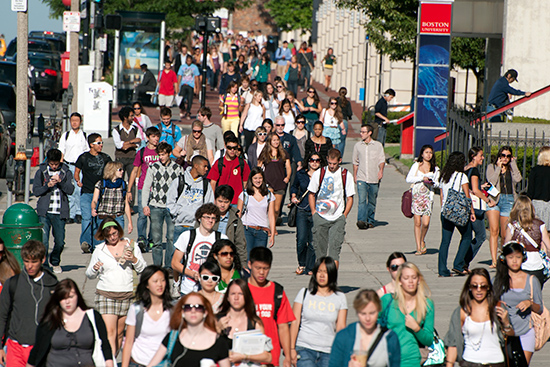BU Moves Forward on Commitment to Faculty Diversity
Search to begin for University-wide associate provost

The University will hire an associate provost to promote a culture of diversity and inclusion across the institution. Photo by Kalman Zabarsky
As part of an effort to attract and retain diverse faculty and promote a culture of inclusion across the institution, BU will appoint a University-wide associate provost for faculty diversity and inclusion and equivalent officers in each of BU’s schools and colleges.
The new position, announced in a memo sent yesterday to faculty by President Robert A. Brown and Jean Morrison, provost and chief academic officer, are the central recommendation of the five major recommendations of the Task Force on Faculty Diversity and Inclusion, which have the support of the president and provost. The others are:
- The creation of implementation and standing committees focused on faculty diversity and inclusion.
- The development of strategic plans for faculty diversity and inclusion across all BU schools and colleges.
- Public and regular communication about diversity and inclusion at BU.
- The creation of doctoral-faculty pathways for underrepresented minorities.
The associate provost “will provide enhanced leadership and support for our collective efforts to further diversify our community and to create a more inclusive environment,” Brown and Morrison wrote.
“This is an incredibly important moment for us as an institution and as a community to elevate our commitment in this critical area, to advance meaningful dialogue around diversity and inclusiveness, and to be responsive to the concerns and aspirations voiced by our students, faculty, and staff,” Morrison says.
The associate provost will be “an authority on how to diversify the faculty and to think about the diversity of staff and students, and how all of these things interact,” says task force cochair Gene Jarrett, a College of Arts & Sciences professor of English and associate dean of the faculty, humanities. “We make the case that having this kind of person is ideal for the current state of BU and for addressing the challenges ahead.”
“We are grateful for the outstanding work of the task force over the last year and for a set of recommendations that we believe place Boston University in a strong position to succeed and remain relevant as a global research institution that is reflective of the world around it,” Morrison says. “There is considerable work ahead of us, to be sure. And so, we are pleased to be adding this new executive-level position to our leadership and hopeful for the opportunities it will afford in the years ahead for active engagement and the achievement of measurable, lasting results.”
“Universities are going to thrive in the future if they are able in some rough measure to reflect the diversity of the culture, the country and—as global institutions—the world,” says task force cochair Stephen Brady, a School of Medicine associate professor of psychiatry, a Graduate Medical Sciences assistant dean, and director of MED’s Mental Health Counseling and Behavioral Medicine Program.
The associate provost for diversity and inclusion will report to Morrison and serve as a member of the Provost’s Cabinet as well as of the University Council. BU will conduct a national search to fill the post by fall 2017; a search advisory committee will be named in the coming weeks. Recommendations for outstanding candidates for this role, both internal and external to BU, can be submitted to provost@bu.edu.
The associate provost will establish programs and initiatives to foster campus-wide awareness of, and commitment to, the University’s diversity goals; serve as a resource and catalyst for implementing best practices across BU; work to develop shared accountability for making progress on goals; measure the effectiveness of programs; and promote an overall culture of inclusion throughout the University.
“Diversity is very important because our student body is increasingly diverse and our society is increasingly diverse,” says Jarrett. “Also, the advancement of any institution of higher education depends on the diversity of ideas. There are many different ways to define diversity. There is racial and ethnic, but there is also diversity of ideas, disability, gender, and sexuality.”
The task force studied the literature and diversity internally and at peer institutions and surveyed minority faculty at BU in preparing its report. The number of underrepresented minority faculty at BU has been relatively stable since 2013, when it was 6.9 percent, but that needs to grow, Brady says.
“You get better outcomes with diverse people sitting around the table, in decision-making, creativity, the way we think about problems,” he says.
The task force comprised 18 faculty and staff from both the Charles River Campus and the Medical Campus.
The task force held two dozen sessions across the two campuses, in every school and college, to speak with faculty and students. The strongest takeaway from their conversations with students, Brady says, was that they too place a high priority on diversity among both faculty and staff—“all the people that touch them in their lives at BU.”
“While the appointment of a new Associate Provost for Diversity and Inclusion will provide enhanced leadership and support for our collective efforts to further diversify our community and to create a more inclusive environment, attaining our institutional goals related to diversity and inclusion will require a renewal of our shared commitment and attention to our individual responsibilities to all levels of the University,” Brown and Morrison wrote in their memo.
Comments & Discussion
Boston University moderates comments to facilitate an informed, substantive, civil conversation. Abusive, profane, self-promotional, misleading, incoherent or off-topic comments will be rejected. Moderators are staffed during regular business hours (EST) and can only accept comments written in English. Statistics or facts must include a citation or a link to the citation.